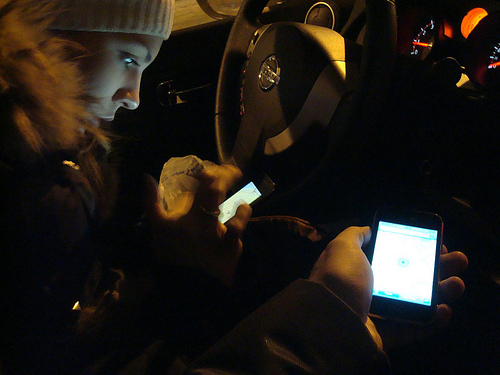GPS navigator iPhone 3G in the middle of Russia
Instead of eating Olivier and drinking vodka on New Year's holidays, we decided to go by car from our native Samara to Nizhny Novgorod. In the meantime, we tested the function of GPS-navigator in iPhone 3G in real conditions. Reviews are a new thing for me, but I hope you will understand and forgive me.

The road to Nizhny Novgorod is not the easiest, plus, it’s also quite difficult to navigate around the city. So I bought a road atlas and drew our way with a pen. But these are all old-fashioned ways. We had two iPhones connected to a megaphone and a biline. In these phones there is a GPS navigator function, and it takes maps via the Internet via Google Map.
')
This is how it all looks like. You press the "target" in the corner and after a few seconds your current location is shown on the screen.

The bad:
Good:

The road to Nizhny Novgorod is not the easiest, plus, it’s also quite difficult to navigate around the city. So I bought a road atlas and drew our way with a pen. But these are all old-fashioned ways. We had two iPhones connected to a megaphone and a biline. In these phones there is a GPS navigator function, and it takes maps via the Internet via Google Map.
')
This is how it all looks like. You press the "target" in the corner and after a few seconds your current location is shown on the screen.

The bad:
- Maps of regions and cities of Russia in Google are not very detailed. There is no route for them and not all roads are marked. Signs, speed limits and one-way streets can not even dream. When I was in Moscow, I appreciated how convenient it is to build routes. The phone writes where to turn and counts kilometers to the destination. Let's hope that Google will improve their cards in the near future.
- The card is not spinning. That is, it is not clear where to go, so that the blue circle moves, for example, to the left. On the track, everything is clear, but in the tangled city blocks it is not very convenient. It was necessary to go first at random to understand the direction.
- GPS is not weakly eating a battery. Fortunately, we had a car charger.
- Maps are downloaded from the Internet, and the connection is not everywhere. In reality, we did not cause problems. But there is a potential ambush.
- Very bad search on objects. Finding the right hotel, restaurant or shop through text search is almost impossible. But this, again, is the problem of Google Maps and the laziness of the owners of objects that do not mark them on the map.
Good:
- The iPhone quickly finds the current position. I have seen how other gps-receivers work, it happened there much longer.
- AGPS, which everyone was so afraid of during the announcement of the iPhone 3G, turned out to be a cool thing. We survived several fairly serious snowfalls and could not find a telephone due to cloudiness. But the prefix "a" (assisted) saved us, because it found our location on the base stations of the telecom operator. Accuracy is lower than satellites, but better than nothing.
- It is convenient to “put pins” - mark some of your points on the map. For example, mark the hotel to easily find it.
- It really works! Of course, we stalked from time to time, but in the end we came to the right place.
Source: https://habr.com/ru/post/48598/
All Articles